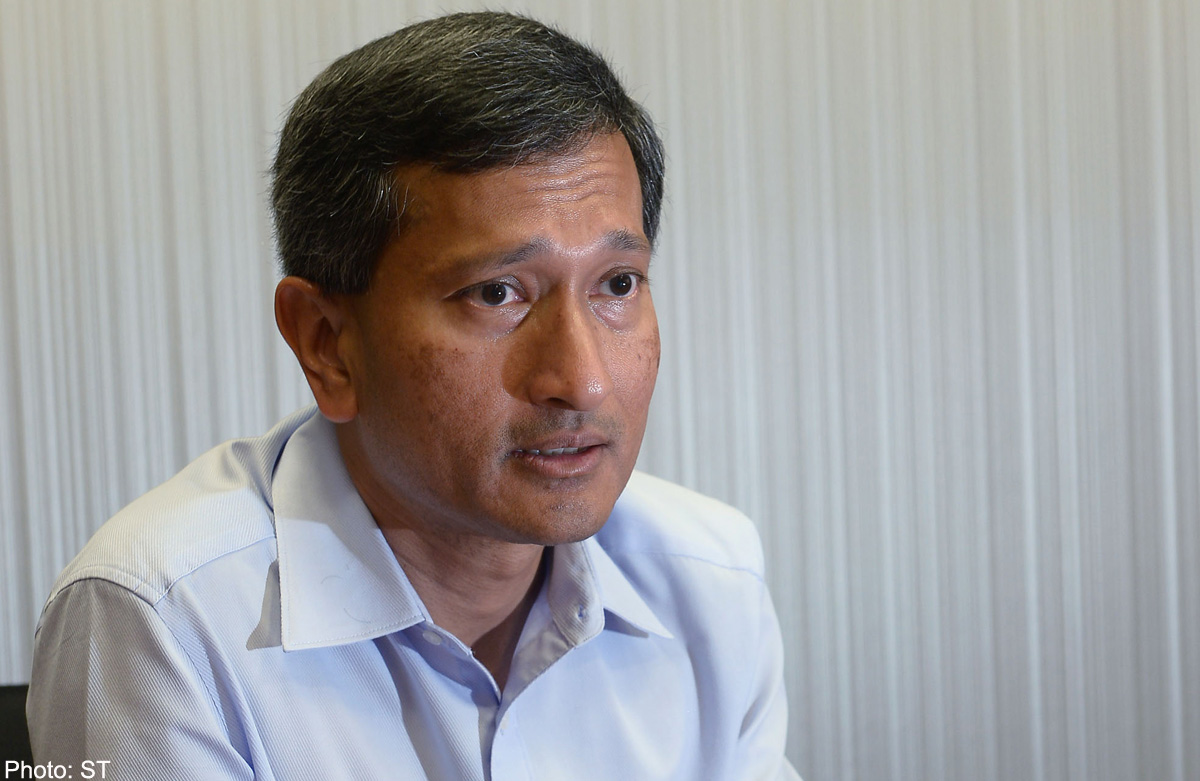Singapore does not take a position on territorial claims in the South China Sea but, as a small state, it has a vital interest in ensuring disputes are resolved peacefully, Foreign Minister Vivian Balakrishnan said.
And it cannot accept that “might is right”, he told Parliament in a speech during the debate on his ministry’s plans and policies.
Several MPs had, a day earlier, raised concerns about ongoing tensions in the South China Sea that made headlines in recent weeks, and asked how territorial disputes there might affect Singapore’s ties with the countries involved.
China has done extensive reclamation work, built runways and ports, and deployed significant military assets to the disputed waters, Dr Balakrishnan noted.
While some claimant states have also done similar activities, these “have not been on the same scale or pace as that conducted by China”.
“What a major power does inevitably carries a far bigger signature. China, for its own reasons, has become more assertive in the East and South-east Asian regions,” he added.
Four ASEAN members – Brunei, Malaysia, the Philippines and Vietnam – have overlapping claims in the South China Sea with Beijing.
But Dr Balakrishnan noted that economics is the centrepiece of the ASEAN-China relationship, and the grouping will mark the 25th anniversary of relations with China with a special summit later this year.
“We all stand to lose if tensions escalate and it is thus important to maintain open dialogue on issues of mutual concern, to prevent contentious issues from overshadowing the overall ASEAN-China relationship,” he said.
ASEAN and China are also working on implementing a declaration on conduct in the South China Sea, including a hotline for maritime emergencies, and both sides have had “productive and frank” discussions on a code of conduct, he added.
In his 40-minute speech, Dr Balakrishnan said Singapore was a small state in a tough neighbourhood, without the natural advantages of bigger countries.
Hence it had to stay united, relevant and nimble and constantly navigate choppy geopolitical waters.
Turning to the United States-China relationship, he noted that while there is some degree of competition between the two powers, they will not embark on an “all-out confrontation” given their intertwined economies and common interests.
The dynamics of China’s relationship with Japan, a US ally and the world’s third largest economy, with which it has longstanding territorial disputes, are also complex. Dr Balakrishnan said: “We hope all these major powers will work closely together to tackle issues of common interest, and avoid direct and destabilising confrontations.”
These tensions were also described by Defence Minister Ng Eng Hen as “symptomatic of a more powerful dynamic of strategic rivalry and rising nationalism”.
He observed that the dynamic has stressed existing military co-operation and alliances, as well as international agreements.
He noted during the debate on the Defence Ministry’s budget that Japan regularly scrambles its fighter jets in response to Chinese military aircraft entering disputed airspace in the East China Sea.
Indonesia has also confiscated and destroyed some 150 foreign fishing boats that entered its exclusive economic zone since President Joko Widodo took office in 2014.
Incidents like these are on the rise as Asia ramps up military spending, Dr Ng added.
“Rising nationalism and improving economies have fuelled many Asian countries to spend larger and larger sums to modernise their militaries. In itself it’s not wrong. But with more capable militaries, miscalculations or missteps can precipitate serious tensions and even physical conflicts,” he said.

This article was first published on April 8, 2016.
Get a copy of The Straits Times or go to straitstimes.com for more stories.






